Spellbook is an enchanting Halloween treat
Spellbook is the brand new game from acclaimed designer Phil Walker-Harding – creator of such fantastic games as Sushi Go Party, Imhotep and Barenpark. Walker-Harding is known for creating straightforward, engaging games that almost anyone can play — and Spellbook is no exception, rapidly becoming a family favourite in our house.
In Spellbook, one to four players take on the role of sorcerers or wizards, and must expand their understanding of magic by learning the different spells that are set out in front of them. In practical terms, there are seven spells per player in every game, and each player will always use the same set of spells. Spellbook features three spells (ranked 1, 2 and 3 stars) for each of seven different schools of magic, and every game will feature one spell from each school.
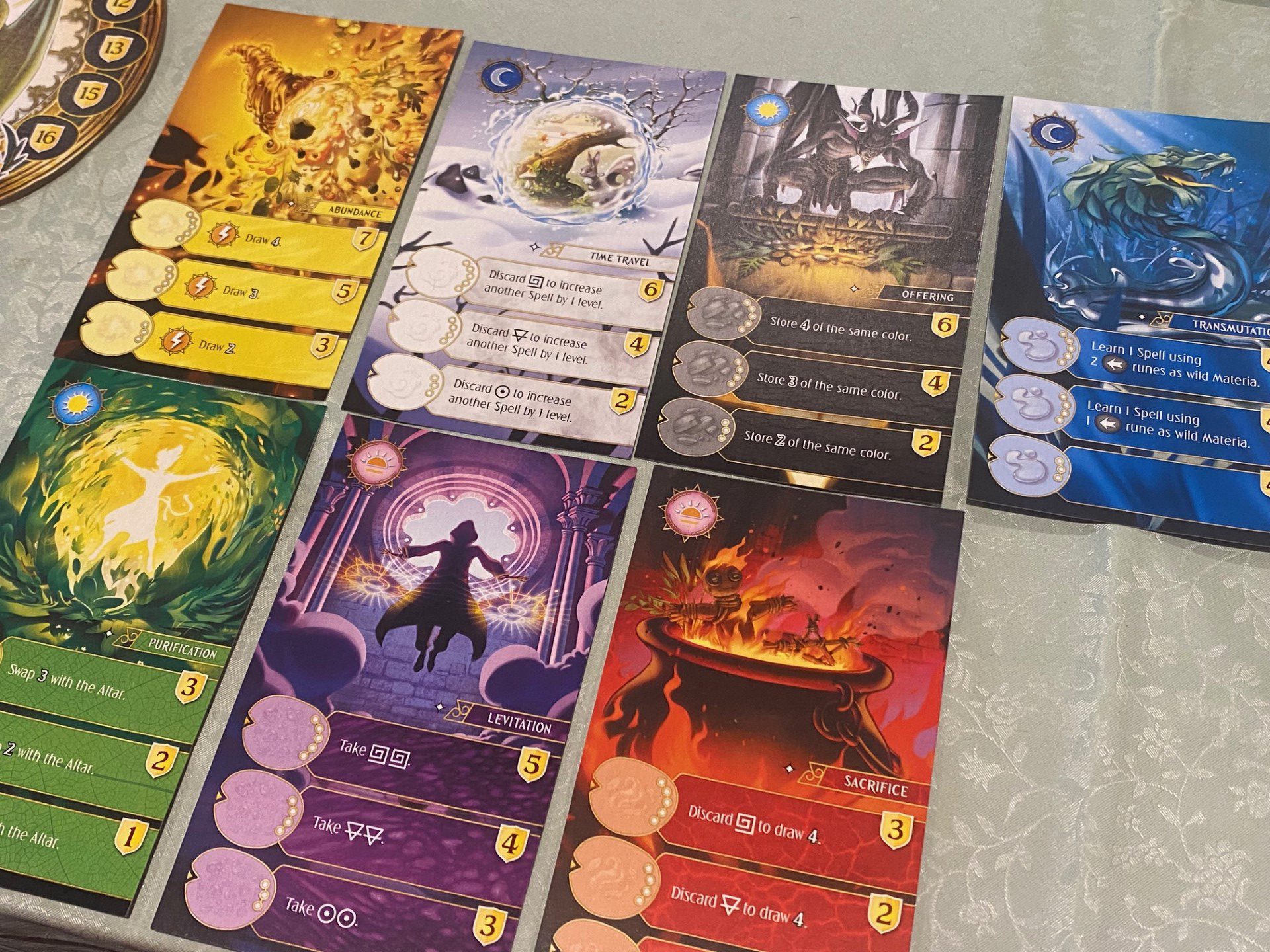
In your first game (at least), you’ll probably use the basic set of seven level 1 spells — which are simpler to use. Then in future games, you’ll replace those with either all level 2 or level 3 spells, before finally migrating to the “Classic Game.” In this mode, each player will take turns to draft specific spells, creating a mix of all the different levels and allowing players to form a bit of a strategy before the game even begins.
When the game begins, players will have their seven spells placed in front of them, as well as a “Familiar Board” and a couple of materia tokens. Materia tokens are variously coloured pieces which players will use to cast their spells, and Spellbook uses bright, plastic chips that look really nice and should last quite well over repeated plays. In the middle of the table will be a materia bag (including a lovely printed image) and a discard bucket, which is where materia goes once it is spent.
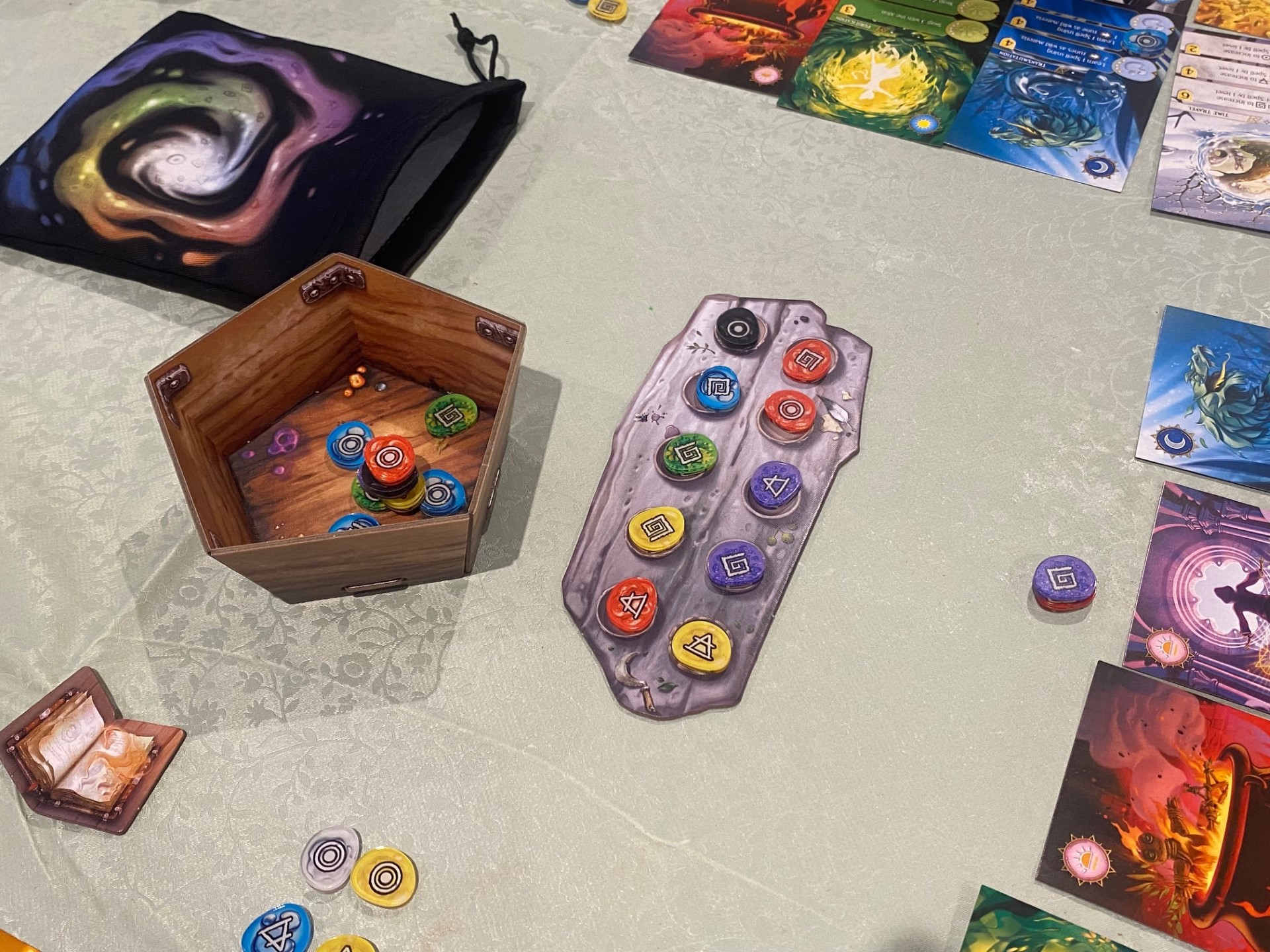
Each turn in Spellbook breaks down into a morning, afternoon and evening phase structure, with either/or actions available at each step. In the morning, a player may either draw two materia from the bag (unseen) or take one of their choice from an altar board which sits between all players. They may instead use a morning spell (which in most cases will also draw materia in some way) if they have already learned it, but this won’t be possible on the first turn.
In the afternoon phase, players will choose to either place one materia token on their familiar (which will accrue end game points depending on how many are covered) or to cast an afternoon spell. Then, in the evening, they may choose to either learn a spell or cast an evening spell. I’ll come back to learning a spell in just a moment, but before I do, I’ll briefly mention that following the evening, the player must also replenish the central materia board (or if it is full, they will clear it to the discard and then replenish it up to five materia).
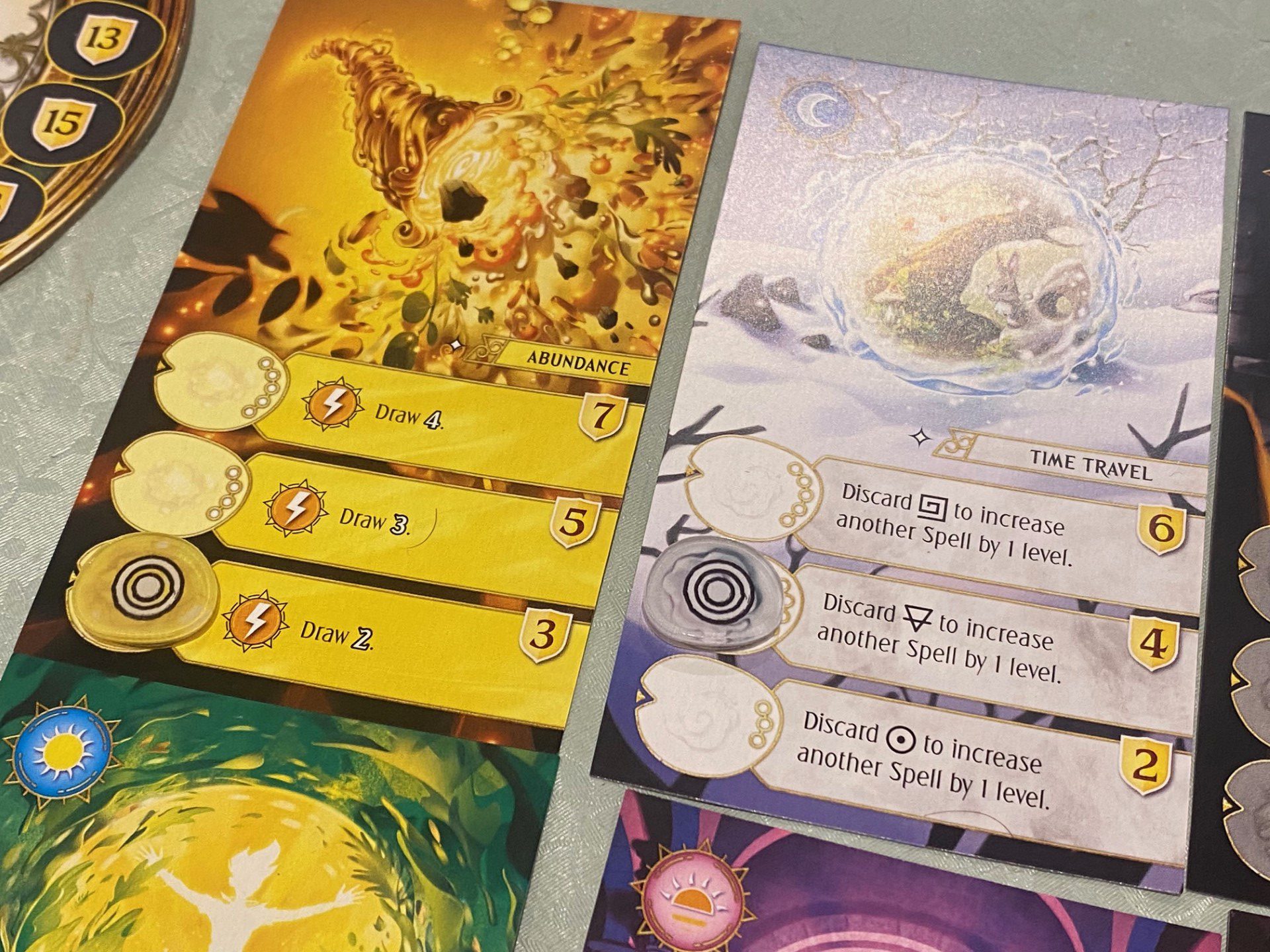
When it comes to casting spells, Spellbook shows one of its more interesting mechanics. All spells can be learned to three proficiency levels, and from bottom up, these require three, four or five colour-matched materia tokens. Each materia has both a colour and a rune symbol, and instead of using all matching colour, three identical runes (of any colour) can be used to replace materia of another colour. For example, to cast a red spell costing three red materia, a player could use exactly three reds (runes don’t matter) or one red and two matching sets of three runes across materia of any colour.
To be honest, this is the only slightly janky rule in Spellbook, and it’s the one thing I found the kids struggled with. Clearly, adult players can get their heads around the idea fairly quickly and it was never a problem with them, but the younger the player, the more coaching I needed to provide on this one. To add additional complexity, there are several spells that affect spellcasting, for example reducing the “off-colour rune” cost from three of a kind to one, which again required a few examples to get across.

One really interesting feature of Spellbook is that players can only learn each spell once — so if you learn it at the lowest level, you won’t be able to benefit from the more powerful (and valuable, in terms of points) variants later. The game end is actually triggered when a player has either filled their familiar track with materia or learned all seven spells, so balancing when and what level spell you learn is a key feature of the gameplay.
Spellbook feels extremely well balanced in this regard. If a player invests in their familiar track each turn, they will score a surprising amount of points — but equally, retaining that materia and spending it on spells is just as valid. Many spells that give benefits such as casting assistance or more materia draw are worth fewer points, whilst some of the highest level spells that have fewer in-game effects can score significantly.
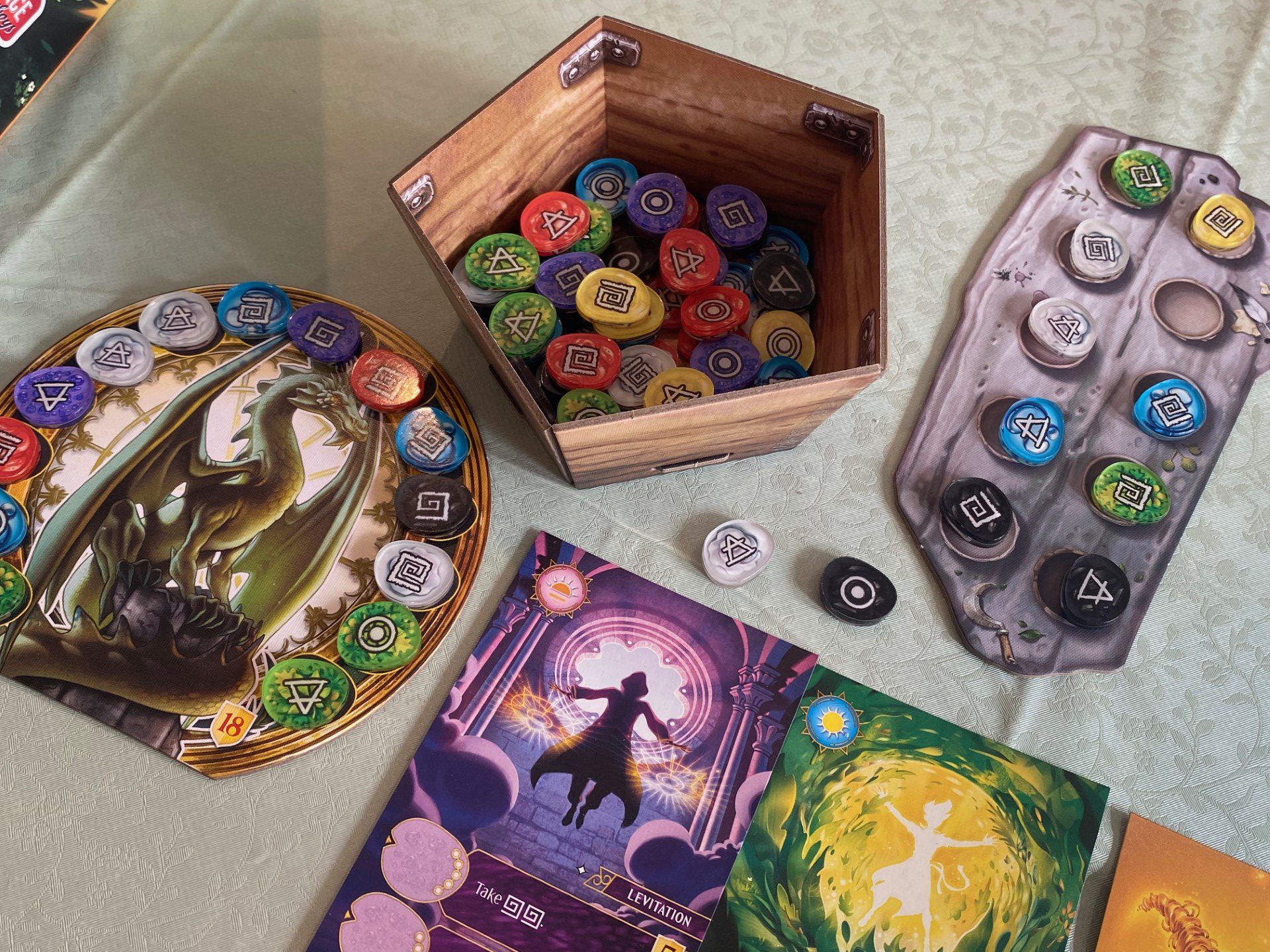
There’s a sense throughout each game of Spellbook that you don’t have quite enough time or materials to do what you want to, but there is always a route to finding it. If you need one materia of a certain colour, for example, there’s a push-your-luck aspect to drawing from the bag, whilst the visible materia board might have the correct colour, but you’ll only get one materia this turn – which feels a bit slow.
Having now played Spellbook about ten or fifteen times with players from six to fifty-six years old, I can say with confidence that Walker-Harding has once again come up with a clever, engaging design that is mostly very straightforward to dive into. Mastery of this game, however, feels a lot of plays away for me – and perhaps the main feature of Spellbook is something that I can’t talk to yet. That feature is the complex possibilities that the different spell combinations offer, and if you can play this game enough with the same people, I suspect the drafting of spell combos will become as exciting and compelling as the game itself.
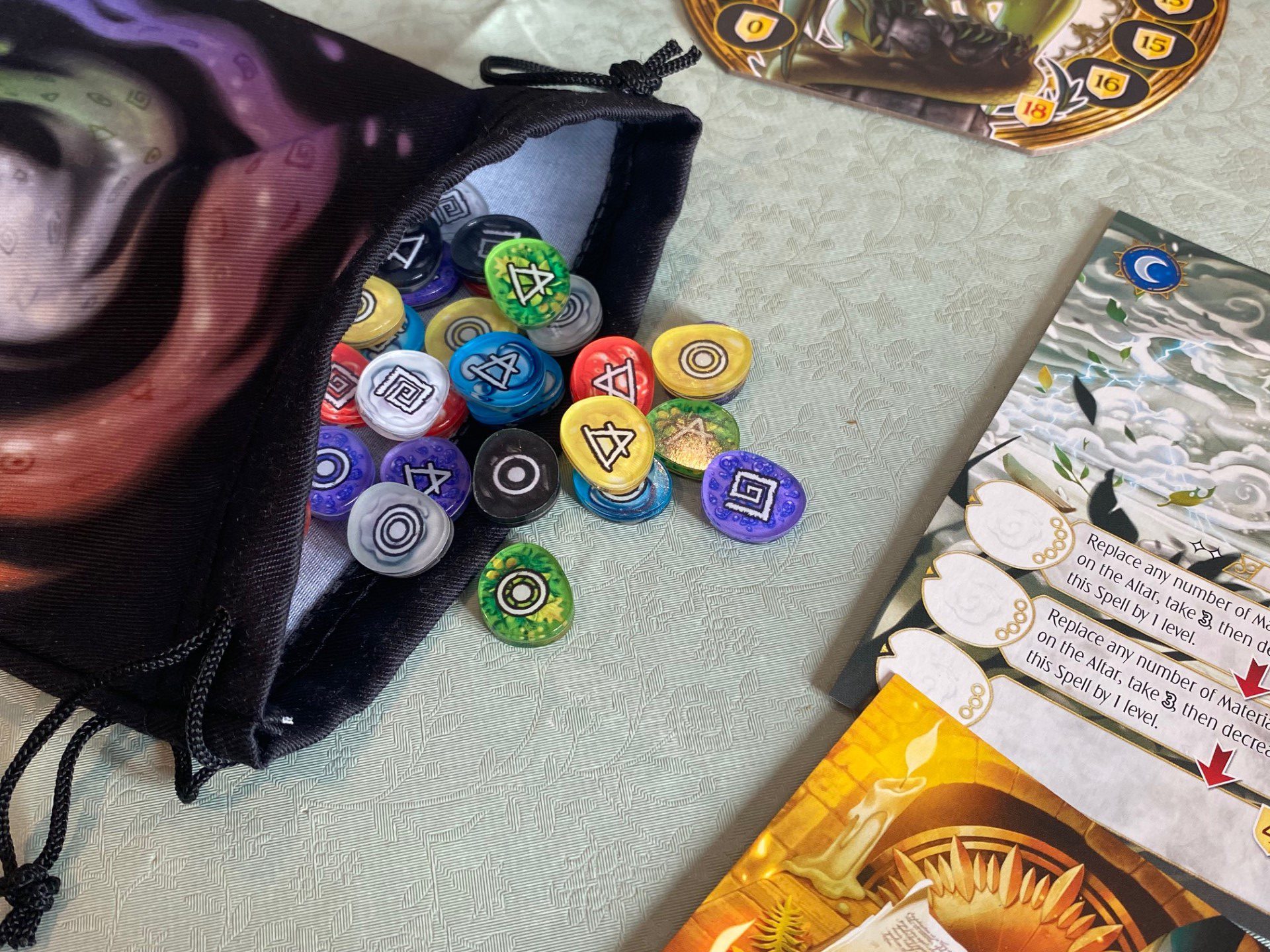
It’s a rare thing for a game to use a single set of components and rules to provide such a broad challenge across players of all ages, skill levels and experience. For a younger or new gamer, simply use the level one set of cards — for core gamers, use all three sets and play the Classic Variant with its drafting mechanic. Either way, Spellbook is both exactly the same and completely different at the same time, and for me, that shows what an exceptional design it is.
You can find Spellbook on Amazon.
Comments are closed.